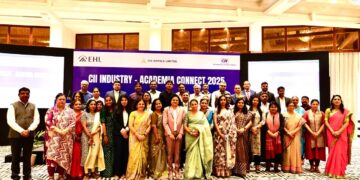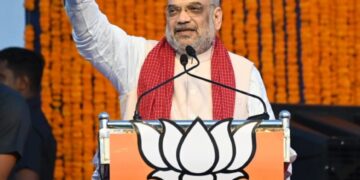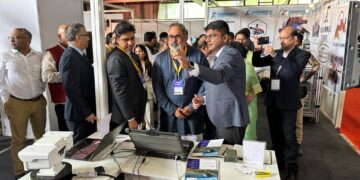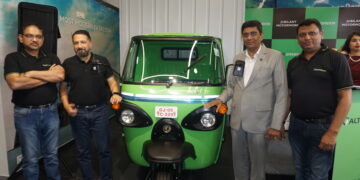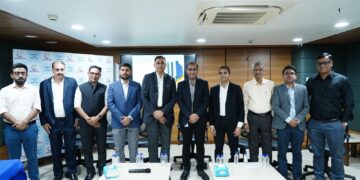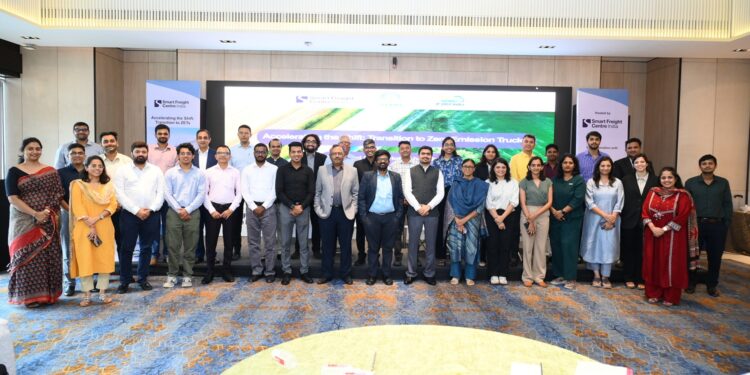Ahmedabad, 3 July 2025: A high-level workshop titled “Accelerating the Shift: Transition to Zero-Emission Trucks” was held in Ahmedabad, jointly organized by Smart Freight Centre India and the Gujarat Energy Research & Management Institute (GERMI). The workshop convened key stakeholders from government, industry, academia, logistics, and startups to explore strategies for accelerating the deployment of Zero-Emission Trucks (ZETs) in Gujarat and across India. This workshop is part of NITI Aayog’s national e-FAST initiative, aimed at strengthening regional ecosystem readiness to support zero-emission freight solutions.
Pramod Rajendran from Smart Freight Centre India highlighted that “Gujarat has long been a pioneer in industry, infrastructure, and clean energy. With the right policy push, logistics innovation, and collaborative spirit, the state can emerge as a model for zero-emission freight. Today’s workshop brings together the ecosystem needed to turn ambition into action.”
As freight trucks carry nearly 70% of India’s goods, contributing to maximum percentage of road transport emissions, transitioning to zero-emission alternatives is not only a climate imperative but also a significant economic and industrial opportunity. Gujarat has been at the forefront of this transformation, being among the first states to extend targeted incentives for electric freight vehicles under its EV Policy 2021. With strong policy intent, a robust industrial ecosystem, and progressive electrification efforts, the state is well-positioned to lead India’s freight decarbonization journey.
“As India advances towards a zero-emission transport future, securing a resilient and self-reliant supply chain for critical minerals is non-negotiable. At GMDC, we are not just mining rare earth elements—we are building a complete ecosystem from mine to magnet. Gujarat is poised to become the hub for critical mineral processing, innovation, and partnerships, powering the next generation of electric mobility for India and beyond.” Said Shri Dhananjay Sharma, Dy. General Manager, Rare Earths Elements Project, GMDC. (A Govt. of Gujarat Enterprise)
“Electric trucks are just one part of the solution. What matters is how the whole freight system functions — from loading to routing to charging. If turnaround times rise, adoption stalls. Our research at IIM-A shows that improving the process — not just the truck — is key. Policymakers should focus on emissions outcomes, not mandate technologies. Let fleets choose what works, as long as it’s clean. Sustainability must make business sense to truly scale.” Prof. Debjit Roy, Ph.D., Founding Co-chair, Centre for Transportation and Logistics, IIM-Ahmedabad
The first panel discussion focused on key enablers for ZET scale-up in Gujarat. Representatives from GMDC, Ashok Leyland, SVNIT Surat, and the Institute of Infrastructure Technology Research and Management explored the full value chain—from rare earth mining and domestic battery material supply to OEM readiness and charging infrastructure. Discussions emphasized the importance of MW-level charging stations powered by renewables, integration of vehicle-to-grid (V2G) systems, and the role of academic institutions in planning, pilot validation, and EV workforce development. Panelists also stressed the need to build fleet operator confidence by ensuring real-time performance monitoring, reliability, and transparent total cost of ownership (TCO) metrics.
The second panel, which included representatives from Adani Cement, moEVing, Switch Labs, IIM Ahmedabad, and Cubenz Power, delved into the operational and policy frameworks needed to unlock ZET investment in Gujarat’s logistics sector. Key themes included minimizing vehicle idle time, the importance of public charging hubs, and anchor demand creation through large freight users. Panelists identified sectors such as cement, pharmaceuticals, dairy, and ports as prime candidates for early ZET deployment via closed-loop logistics routes. The discussion also underscored the need for collaborative models involving shippers, state industrial agencies, and power utilities to co-develop shared charging and maintenance ecosystems.
The workshop concluded with a shared recognition that Gujarat’s strengths—progressive EV policies, industrial depth, strong power infrastructure, and innovation mindset—make it an ideal testbed for freight electrification. Participants called for targeted fiscal and regulatory measures including road-tax waivers, OPEX subsidies, and special EV charging tariffs. Transparent pilot projects and data-sharing on performance metrics were highlighted as essential to scaling trust and adoption. Stakeholders also emphasized the urgency of building public-private partnerships and cross-sector collaboration to deliver real impact.

